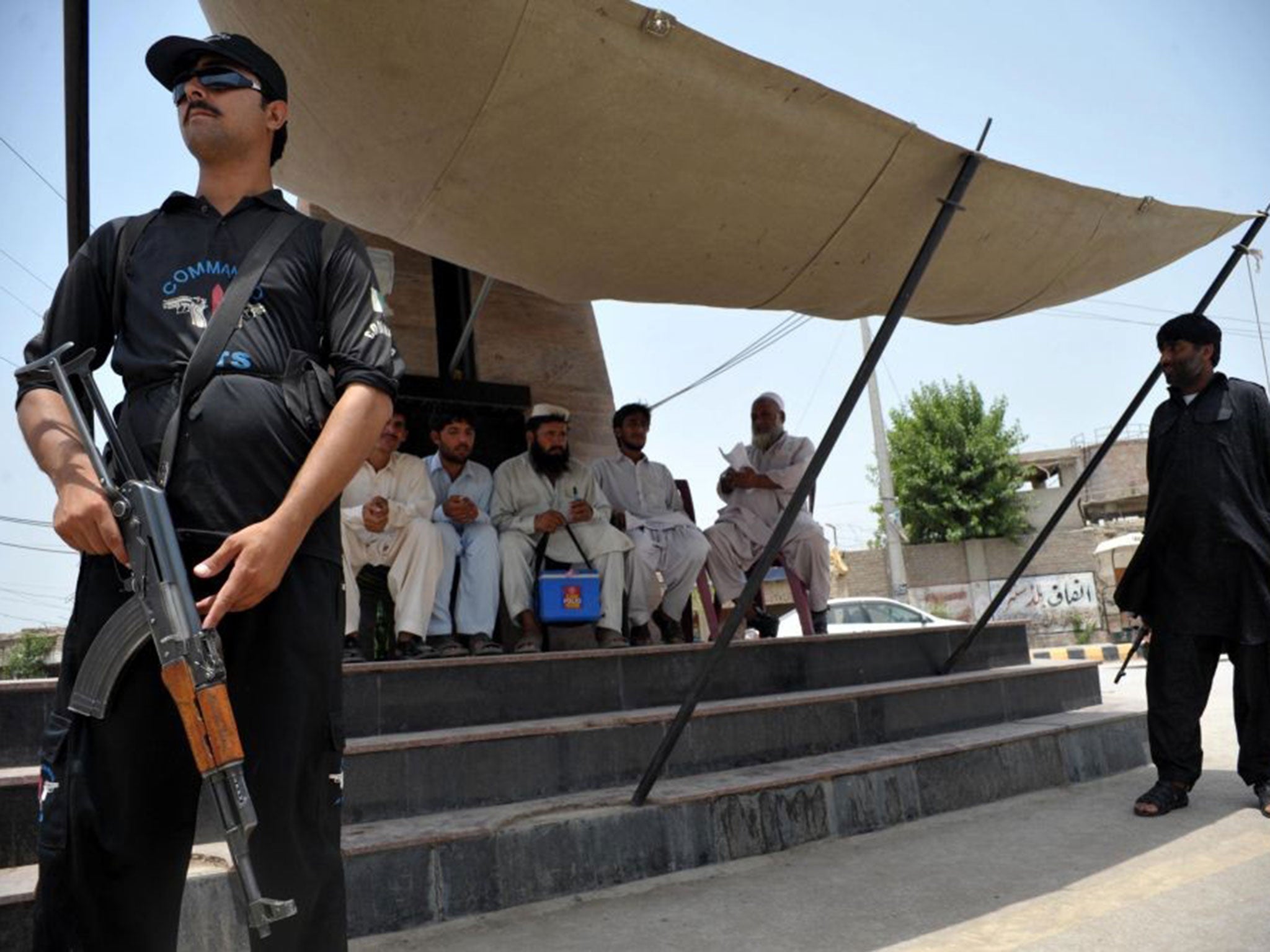Polio battle: How Pakistan’s refugee problem helped in one of final frontiers
Exodus of million people from tribal regions provided opportunity to vaccinate hundreds of thousands against disease

It has been called a blessing in disguise. The evacuation of more than one million people fleeing a military operation in north-west Pakistan has provided anti-polio workers with a rare opportunity to vaccinate children normally out of reach to them.
Latest figures show around 425,000 people, including 250,000 children under the age of five, have been vaccinated at transit camps established on the edges of North Waziristan. Health workers are also treating youngsters against measles, tuberculosis and other diseases.
“North Waziristan has been shut off since June 2012,” Dr Bilal Ahmed, a Pakistani polio specialist with Unicef, told The Independent. “There had been a ban on polio workers.”
Along with Afghanistan and Nigeria, Pakistan is one of three countries where polio remains endemic.
The government, along with a series of international agencies, has made serious efforts at combating the disease. But there remain huge challenges, including dealing with a public wariness, the impact of shifting populations and the storage of vaccines. Polio workers have been repeatedly attacked and killed.
One of the most pressing difficulties has been confronting the disease in Pakistan’s north-west, and in particular its tribal areas. Long-held suspicions about polio workers, combined with the remoteness of the region, meant many children there were not vaccinated.
Such suspicions grew following the 2011 US operation to kill Osama bin Laden, where the CIA had recruited a Pakistani doctor to organise a fake vaccination drive to try and obtain a DNA sample from the children living inside the Abbottabad compound. Of the 104 cases of polio reported so far in 2014, up from a total of 93 last year, the majority were located in the Federally Administered Tribal Areas (FATA), or the adjoining Khyber Pakhtunkhwa (KPK) province.
Nowhere has been more of a challenge than North and South Waziristan, which have long been strongholds for Taliban and al-Qa’ida fighters. In the summer of 2012, the Taliban announced it was banning polio workers from the areas in retaliation for continuing US drone strikes.
As a result, hundreds of thousands of youngsters missed out on receiving the oral vaccinations, permitting the disease to make further inroads. This year, more than 70 cent of all polio cases were detected in North Waziristan.
In June, the Pakistan military announced it was launching a ground operation against militants in North Waziristan. The offensive, in conjunction with air strikes against suspected militant targets, followed a militant attack on Karachi International Airport and mounting concern about the militants’ spread.
As the operation intensified, large numbers of local people fled into neighbouring areas. The latest figures from the government’s FATA Disaster Management Authority suggest a total of 1,002,002 evacuees in emergency camps, or living with relatives, in towns such as Bannu in KPK, where 80 per cent of people headed to.
Health workers say the flood of people into areas not in the control of the Taliban has provided them with an unanticipated chance to approach families from North Waziristan and ask them to have their children vaccinated. Large numbers have agreed.
Figures collated by the Global Polio Eradication Initiative, a project involving UN bodies and national governments, suggest that between 21 May and 16 July, polio workers were able to vaccinate 425,780 people at transit camps, around 250,000 of whom were children under the age of five. Youngsters this age are most vulnerable to the disease. Workers were also able to liaise with community leaders. Meanwhile, as tens of thousands of families also fled west into Afghanistan, more than 35,000 children under the age of 10 were vaccinated at the border.
“The internally displaced person issue has been a blessing in disguise,” said Professor Iqbal Memon, president of the Pakistan Paediatric Association. “When these people have been coming out of the areas in which they reside, they are being vaccinated.”
Campaigners are aware the movement of people from high-risk areas also increases the risk of infection as they travel. Officials say they have tried to tackle this by monitoring communities and increasing their vaccination programmes in these areas.
They have also been reaching out to influential members of the community, especially Muslim religious leaders. They have been asked to spread the message that vaccination is the best way to save their children from an incurable crippling disease.
A conference of religious leaders and scholars met in June in Islamabad and issued a ruling that said there was nothing harmful about vaccinations and they did not breach shariah. “It is obligatory for parents and it is the right of the children to be saved from the crippling disease and its lifelong adverse effects,” the group said.
Despite such pronouncements, or fatwas, Pakistan remains a major problem for those seeking to rid the world of polio. Unlike in Afghanistan and Nigeria, the number of cases in Pakistan increased last year. Last year, World Health Organisation officials revealed that a polio strain that had broken out in Syria had originated in Pakistan and described the north-west city of Peshawar, capital of KPK province, as the largest reservoir of the disease in Pakistan. The WHO said 90 per cent of Pakistan’s cases were genetically linked to Peshawar.
Earlier this year, Bill Gates, who has poured billions of pounds into trying to eradicate polio, said violence in Pakistan and Nigeria was threatening his plan to get rid of the disease by 2018.
Meanwhile, the operation in North Waziristan continues. Last week it was reported bombing raids had killed 30 suspected militants. The military claims 600 militants and 35 soldiers have been killed since the operation began.
Subscribe to Independent Premium to bookmark this article
Want to bookmark your favourite articles and stories to read or reference later? Start your Independent Premium subscription today.

Join our commenting forum
Join thought-provoking conversations, follow other Independent readers and see their replies